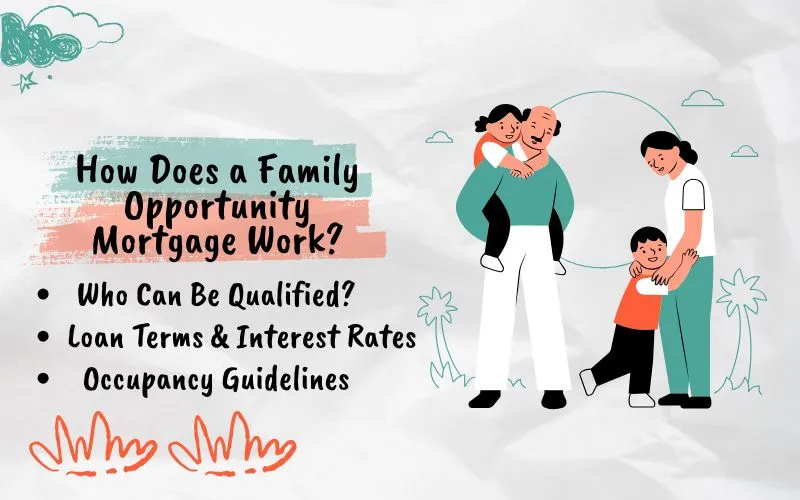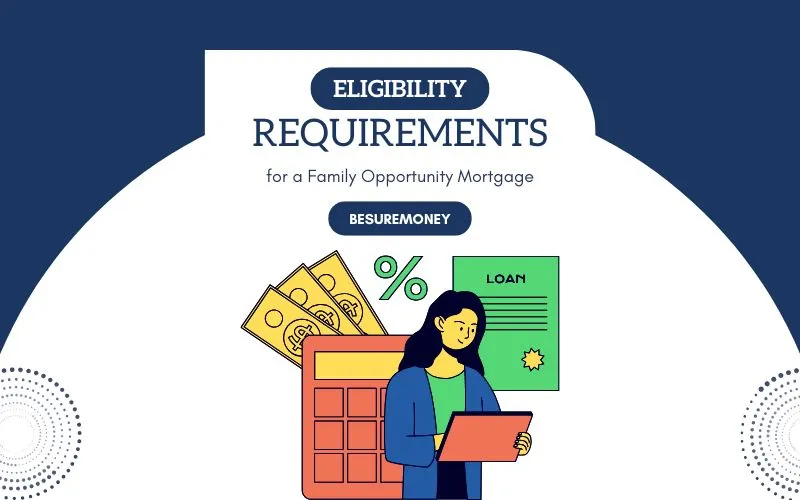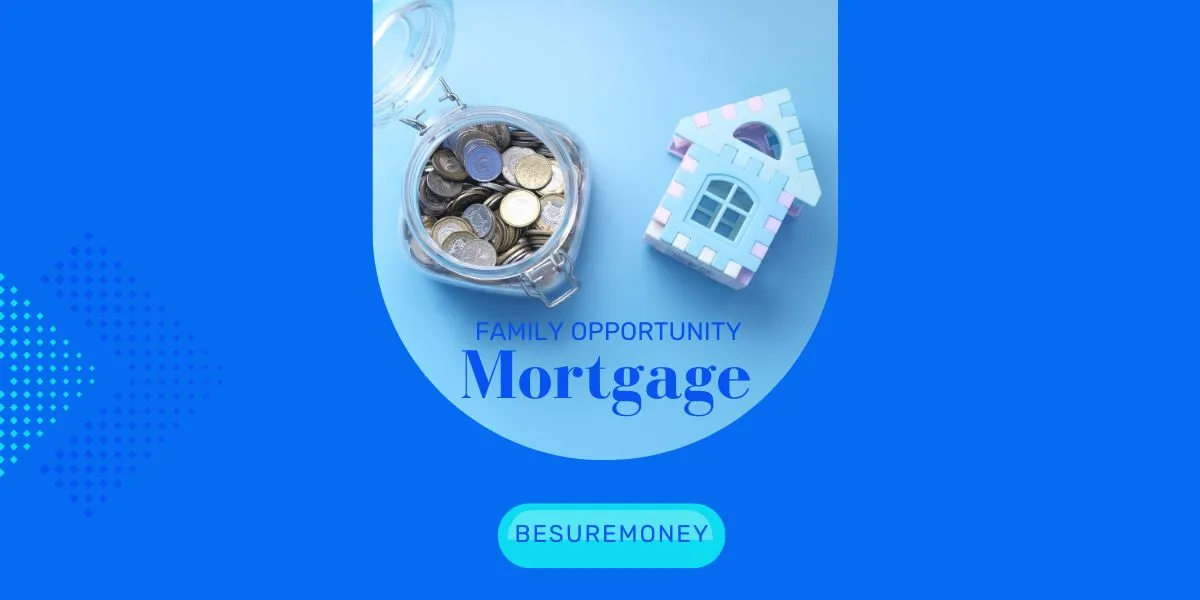Introduction:
Purchasing a home for a loved one is tricky if traditional mortgage schemes are not flexible enough to fit your needs. A Family Opportunity Mortgage lets you buy a home for disabled relatives, older parents, or children in need—without paying more for an investment property loan. In 2025, with housing affordability being an issue, this scheme is an affordable way to obtain housing for your loved ones and benefit from reduced interest rates and good terms. This book will outline how the mortgage scheme works, the advantages, the qualifications, and how to apply.
What is a Family Opportunity Mortgage?
The Family Opportunity Mortgage is a specific form of loan that allows you to buy a residence not only for your elderly parents, a relative with disabilities, or a child who will not be considered as an investment property to be rented, but also for those properties that are for personal use. In this case, the financial charges will be lower, and you can also benefit from some other advantages, such as the possibility of a shorter repayment time, having to pay lower interest rates, and being able to refinance the property. This method is beneficial when you want to live with the person you use to help and the homeowner is equipped with low housing costs.
How Does a Family Opportunity Mortgage Work?

The Family Opportunity Mortgage is a mortgage product that allows people to buy a house for family members, for example, their old parents or a disabled family member, without it being treated as an investment property hence they can still be able to benefit from lower interest rates and better loan terms similar to those provided for a primary residence.
This is how it is made:
Who Can Be Qualified?
- Parents who are purchasing a home for their child who is financially dependent.
- Children who are acquiring a home for the elderly or disabled parents who are not able to qualify on their own.
- A buyer buys for a family member who is permanently disabled.
- Parents are acquiring a home for their child who is financially dependent.
- Children are buying homes for their aging or disabled parents who are unable to qualify alone.
- A buyer buys for a family member who is permanently disabled.
Loan Terms & Interest Rates
- Similar to a primary residence mortgage, with reduced rates compared to second homes or investment properties.
- Standard down payment requirements (as low as 3-5% for conventional loans).
- Favorable debt-to-income (DTI) ratio requirements for borrowers.
Occupancy Guidelines:
- The family member living in the home may not necessarily have to be on the loan.
- The buyer (borrower) is not required to live in the home.
- Understanding these key factors helps you determine whether the mortgage suits your family’s needs.
Eligibility Requirements for a Family Opportunity Mortgage in 2025:

For 2025, the basic conditions of a Family Opportunity Mortgage need any borrower’s compliance with some exclusive financial and occupancy terms. For instance, one must:
Credit Score:
- A minimum credit score of 620 is mandatory for conventional loans.
- Higher scores (more than 700) may result in lower interest rates.
Income and Debt-to-Income (DTI) Ratio:
- Borrowers must exhibit a reliable and steady source of income and observe the lender’s DTI standards (typically not more than 43%).
- Documentation of income, such as duly signed pay slips, tax returns, or bank statements, is necessary
Property Type:
- The house needs to be a single-family type (not a multi-unit or rental property).
- Condos and townhomes could be considered if they comply with the lender’s standards.
Occupancy Rules:
- The family member (parent, child, or disabled relative) is to be the homeowner and has to stay in the home as their primary residence.
- Meeting these requirements certainly smoothes the way for the approval process and thus helps you to finalize a deal on a dream house for your partner or family with agreeable loan conditions.
Benefits of a Family Opportunity Mortgage:
A Family Opportunity Mortgage is packed with many benefits, which make it a perfect choice for people who are willing to buy a home for their loved ones. The following are the main advantages:
Lower Interest Rates:
Unlike investment property loans, mortgages offer rates for primary residences. This helps you save money on interest costs.
Smaller Down Payment:
You may qualify for a lower down payment (as low as 3-5%), which allows more people to achieve home ownership.
No Need for Co-Signing:
The family member residing in the home doesn’t have to be on the loan, thereby removing the financial burden from them.
More Flexible Loan Terms:
- Qualification is much easier in terms of family mortgage compared to that of second-home or investments.
- A conventional loan can be used with longer repayment periods.
Provides Safety for Family Members:
- Guarantees elderly parents, disabled relatives, or dependent children a safe and cheap place of residence.
- These benefits will ensure that a Family Opportunity Mortgage can assist your family members financially and at the same time, make it easier for you to cover the bills.
Potential Challenges and Risks:
While a Family Opportunity Mortgage has many advantages, you still need to take a look at some challenges and risks before you decide to apply:
Legal and Tax Implications:
- Purchasing a house for a family member might trigger tax implications, such as the occurrence of a gift tax.
- It is necessary to talk to a tax professional to know any monetary influence.
Risk of Loan Default:
- As the primary borrower, you are responsible for making the mortgage payments whether your relative can make any contribution or not.
- Late payments could also negatively impact your credit score and initiate a foreclosure process.
Occupancy Fraud Concerns:
- Stating a residence as the primary residence where it is an investment home is subject to penalties and loan denial.
- Make sure that you meet all the lender’s occupancy requirements.
How to Apply for a Family Opportunity Mortgage in 2025
For Family Opportunity Loans, it is best to work on the right track to get approved smoothly. The following is a step-by-step guide:
Look for Lenders:
Since the program is not being offered by all banks, credit unions, or mortgage companies, you should find those who are specialized in Family Opportunity Mortgages.
Check Your Eligibility:
- Go through your credit score, income, and debt-to-income (DTI) ratio conditions.
- Confirm that the property is eligible according to the lender guidelines.
Collect All Necessary Paperwork:
- Get ready your income documents (pay stubs, tax returns, and bank statements).
- Obtain a copy of your credit reports, have your employer verify your employment, and bring property details.
Get Pre-Approved:
Getting a preapproval letter not only makes your deal stronger but also sends a signal to sellers that you are a serious buyer.
Choose the Right Property:
Make sure the house is acceptable to the lender (e.g. single-family, primary residence for the family member).
Finalize the Mortgage:
- Collaborate with the lender for the documentation, home appraisal, and obtaining final loan approval.
- Ensure that you understand the loan terms properly before the closing date.
- By taking these actions, you can get a Family Opportunity Mortgage and enable a comfortable, safe living place for your family members who can benefit from flexible financial terms.
Alternatives to a Family Opportunity Mortgage:
On the condition that a Family Opportunity Mortgage doesn’t work, then a few other sources of finance can be looked into:
Conventional Loans:
If a family member can meet the required criteria independently, a conventional mortgage may be a viable alternative due to its competitive rates and terms.
Government-Backed Loans:
FHA Loans:
A major benefit of this government-backed loan is its lower credit score and down payment requirements that make it a good fit for new and inexperienced buyers.
VA Loans:
This option is perfect for those who are or have been part of the U.S. military, as it provides the opportunity to obtain a mortgage without requiring a single penny as a down payment.
USDA Loans:
They are perfect for a place in a rural area with even a zero down payment.
Co-signing vs. Co-Borrowing:
Co-Signing:
You guarantee that the loan will be repaid, but you do not own the property.
Co-Borrowing:
This means that both parties will have equal shares in the ownership as well as in the responsibility for the loan.
Home Equity Loan or a Home Equity Line of Credit:
Provided you own a house, utilizing a home equity loan or line of credit (HELOC) can give you the money to buy a home for your family member.
Personal Loans or Private Lending:
- As impartial information, people will be provided with personal loans, peer-to-peer lending, or family borrowing as other options only when asked.
- The advantages and disadvantages of each option should be considered; make your choice based on your financial situation and future goals.
Final Thoughts:
Family Opportunity Mortgage can be quite a good solution to supply housing for older relatives, someone with disabilities, or children that are still studying and enjoy lower interest rates and flexible terms as well. Nevertheless, you have to bear in mind the required financial responsibility, eligibility, and the related risks first, though before you move with your application. If this kind of mortgage does not suit you, policies such as FHA loans, VA loans, or co-borrowing could be suitable. Turning to a financial advisor is also a good thing to reach a decision arrived at in the best way for your family’s needs.
